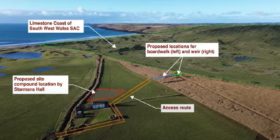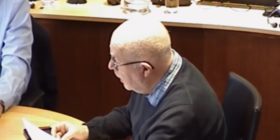Public Compliance With Covid Restrictions Broke Down, Says Councillor

PUBLIC compliance with Covid restrictions broke down during the pandemic a councillor has told a review of a council’s response.
Councillor Phil Murphy said as the pandemic stretched over 2020 and beyond, and restrictions changed with others introduced, the public lost patience.
The Conservative councillor said his recollection was Monmouthshire County Council had responded well, and worked effectively with other agencies, and said “adrenaline” carried it through heavy demand on its resources and staff time.
“Where it broke down, I think, was the public,” said the Caerwent councillor, a member of the Conservative cabinet that controlled the council at the time.
“Initially everybody did as they were told, you can’t go to the pub, they sat at home, the weather was lovely then there was friction, the aisles were closed in the supermarkets.
“My wife became part of the track and trace team, ringing people on the phone, and frequently people told her, in no uncertain terms, where to go and she was not the only one.”
Cllr Murphy later added: “If you had a gathering of two people, you could add a nought to that, it didn’t really matter – because it was going on.”
He said there had been people who had followed the rules “and were afraid to go out the door” and “there were people in the middle who did one version of it.”
He was speaking at the council’s performance and overview scrutiny committee that was considering a report on response from 2020 to 2022 and how well it is prepared for any future pandemic.
Committee chair, Conservative Alistair Neill, said the intention of the report is to “help us as a council and county prepare for what public health experts advise is very likely to be coming, and that is another pandemic.”
The council’s deputy leader, Chepstow Labour Cllr Paul Griffiths, said he wasn’t a councillor at the time but worked as a special advisor to the Welsh local government minister.
A Welsh Government government diagram of public bodies responsible for responding to a pandemic shows local government at the bottom but Cllr Griffiths said: “I would like to reverse that and say we are not at the bottom but the foundation stone because very often we are the link between the organisations and the public.”
David Jones, the council’s head of public protection, said it established a track and trace operation, as it had experience of doing so for outbreaks such as salmonella, that operated from 8am to 8pm, seven days a week. Some officers had worked an 84 hour week as a result and that demand would have to be better managed in future.
The Welsh Government’s process of announcing changes to regulations and restrictions on Fridays also placed additional demand on the environmental health service, which it has told the UK public inquiry into the pandemic response.
Environmental health officer Alun Thomas said it would have to respond to requests from across the council as well as businesses and care homes: “We were expected to be up to speed with changes very quickly and after the announcements on Fridays we would have the phones ringing all weekend, asking how will this work for us on Monday?”
Rogiet Labour councillor Peter Strong said he was concerned the council may not be able to react as quickly in future: “Next time around our pool of people could be too small as we’ve had cut backs and staff have been given more to do.”
The council has kept a log of additional staff who worked during the pandemic and officers were due to take part in a Wales wide desktop training exercise on how to respond to a future pandemic following the meeting on Tuesday, March 19.
Cllr Murphy also said the “Cwtch” online meeting place for all council staff had been “probably one of the best things we’d done”.
Spotted something? Got a story? Email News@News.Wales









